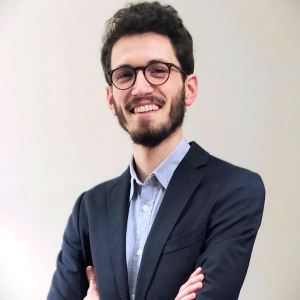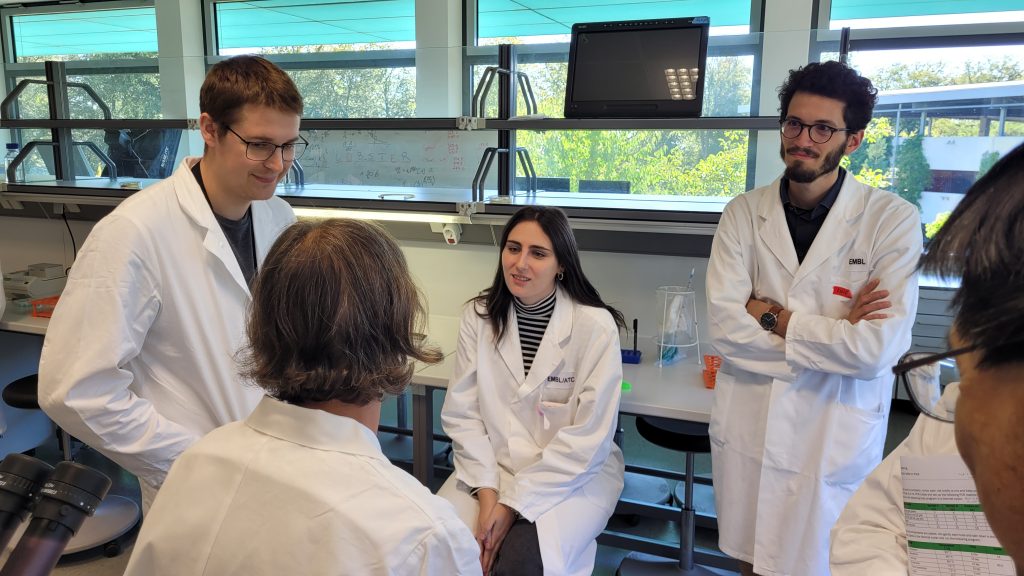‘Worth every moment’: an interview with CRISPR/Cas course attendee Luigi Devis
The EMBL Course ‘Genome engineering: CRISPR/Cas from cells to mice’ is always a highly anticipated and appreciated course amongst our community. Participants learn all about guideRNA design/donor design specific for their targets using commercial and open resource tools, how to generate gene knock-outs/knock-ins, and about using the most current technologies for target validation. For many years, this course has been organized in cooperation with our CPP Partner Thermo Fisher Scientific, who has generously supported it by providing training materials as well as trainers who assist the participants during practical sessions, give talks in the theoretical sessions, and attend all social activities, too – enabling the participants to make valuable connections within the industry and learn from the experts.
The course has now been successfully running since 2016, with the latest edition having taken place in September this year and another one happening in 2024. We spoke to Luigi Devis, one of the participants, about how attending the course has helped him use the CRISPR method in his current research on cancer epigenetics.

Can you tell us a bit about yourself and your research?
I’m a 25-year-old medical doctor from Belgium. I began studying medicine to assist people, with the aim of becoming a general practitioner. However, I came across the field of human genetics late in my studies, and found myself drawn to the work of a medical geneticist. I completed my MD in 2022, and started clinical genetics training that same year at UCLouvain in Brussels.
Medical genetics is rooted in fundamental science. It’s amazing how a tiny molecular alteration can cause such significant phenotypic changes. When I began training, I realised I needed to delve deep into basic science and grasp the workings behind genetic diseases. That’s why I chose to pursue a PhD.
My current research, which I am conducting at the Université libre de Bruxelles (ULB), focuses on cancer epigenetics. In my lab we are looking at a group of genes that are often altered in many types of cancer, all of which encode a protein from a family called methyltransferases. We try to work out the exact function of these proteins and the molecular mechanisms by which their loss of function promotes tumorigenesis, tumour stemness and metastasis. To do this, I use CRISPR-Cas9 to see what happens when I knock-out the genes I’m interested in.
Having a medical background and no experience in using an advanced technology like CRISPR, I knew I had to look for the best training available. I was fortunate enough to be chosen to attend a week-long and rigorous CRISPR training course at the renowned European Molecular Biology Laboratory. Led by leading experts in the field, this hands-on course helped me gain adequate familiarity with the procedure. Thanks to the EMBL CPP Travel Grant, I received financial support for my travel and accommodation expenses, enabling me to fully concentrate on my scientific work.

How has participating in this course impacted your work?
CRISPR is being extensively used in numerous laboratories around the world. The precision of this method for editing the genome is revealing new insights into the exact functions of unique genes. It’s becoming increasingly crucial to become acquainted with this technique. This course enabled me to master the technique and use it immediately in my work.
The course was also an opportunity to meet other researchers and make connections with experts in the field. EMBL’s status as a centre of excellence offers the opportunity to meet exceptional researchers. It also enables the sharing of ideas and experience, fundamental in the current scientific environment. Taking part in this course has definitely added value to my work and my career.
Have you had the opportunity to use the knowledge you’ve acquired in this course in your home institute?
Responding to an immediate need for my PhD, I am directly applying the knowledge I have gained from the EMBL course. The course prioritises practical, project-based learning which enables you to seek answers to your research problems. You can literally bring any problems you have and return home with solutions within a week. This has made the training scheme extremely valuable to me and others in similar positions.
What was the best part about the course?
Science can be fun. The course talks about a topic as important as editing genes, but I felt welcomed in a friendly and convivial place. The course excels in having enthusiastic lecturers and trainers, which is evident in their excellent teaching. Anyone seeking knowledge and practice in this subject matter should consider joining the course. I am proof that EMBL considers all applicants, regardless of their background, and I suggest trying the course. It is worth every moment.

Do you also want to learn all about CRISPR/Cas at EMBL? The next edition of this course will take place 1 – 6 September 2024. Have a look and register your interest here.